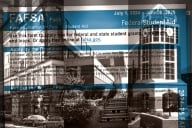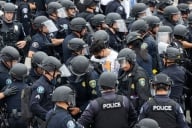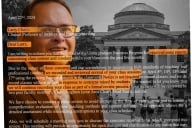You have /5 articles left.
Sign up for a free account or log in.
Shootings at two universities Friday morning each left a freshman dead. The shootings came a week after a lone gunman killed nine people and injured seven more at Oregon's Umpqua Community College in the third-most-deadly mass shooting ever to occur on a college campus.
The events Friday shook the campuses where they took place, Northern Arizona University and Texas Southern University, but nervousness about security extended well beyond those campuses. A number of colleges around the country responded to threats last week, with some campuses shutting down for a day or more and others on heightened alert while reports of threats were investigated.
While experts on campus crime stressed that they did not see patterns in the shootings over the last two weeks, there is little doubt of growing concern. On Saturday, California Governor Jerry Brown, a Democrat, signed into law a bill that will bar people -- even those with concealed weapons permits -- from bringing guns onto campuses.
The Shootings
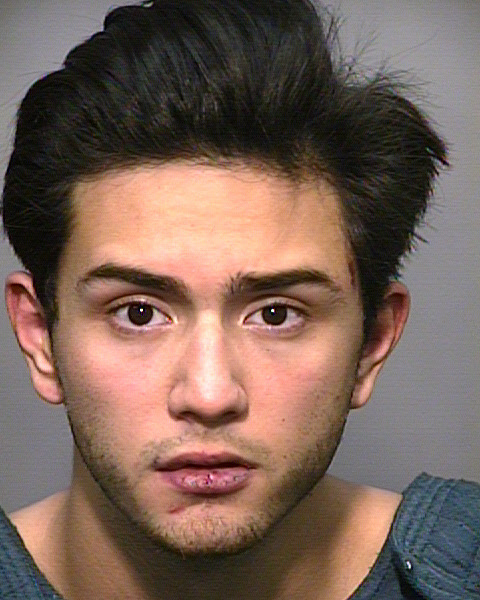 Four students were shot at Northern Arizona University early Friday, and one of them died. The others remain hospitalized as of Sunday. The victims were shot outside a dormitory where many fraternity members live, and several were members of the same fraternity. Steven Jones, a freshman who was charged in the shootings (photo at right), was not a member of the fraternity. Onlookers reported that he was arguing with members of the fraternity and then retrieved a gun and started shooting. The origins of the argument are unclear, but it followed a party. The first calls to security about a shooting came at 1:20 a.m.
Four students were shot at Northern Arizona University early Friday, and one of them died. The others remain hospitalized as of Sunday. The victims were shot outside a dormitory where many fraternity members live, and several were members of the same fraternity. Steven Jones, a freshman who was charged in the shootings (photo at right), was not a member of the fraternity. Onlookers reported that he was arguing with members of the fraternity and then retrieved a gun and started shooting. The origins of the argument are unclear, but it followed a party. The first calls to security about a shooting came at 1:20 a.m.
On Friday afternoon, Jones was formally charged on one count of first-degree murder and three counts of aggravated assault.
 The Northern Arizona student killed was Colin Brough (photo at right from his LinkedIn profile). Brough's LinkedIn page says: "I am a freshman at Northern Arizona University, my first semester here I received over a 3.5 GPA. This semester I started working towards a business degree. My major as of now is business marketing, but I am looking into finance as well. I am associate member of the Delta Chi Fraternity, and a member of the Alpha Lambda Delta Honor Society."
The Northern Arizona student killed was Colin Brough (photo at right from his LinkedIn profile). Brough's LinkedIn page says: "I am a freshman at Northern Arizona University, my first semester here I received over a 3.5 GPA. This semester I started working towards a business degree. My major as of now is business marketing, but I am looking into finance as well. I am associate member of the Delta Chi Fraternity, and a member of the Alpha Lambda Delta Honor Society."
Hundreds gathered at Northern Arizona Friday night in a vigil for the victims of the shooting.
At Texas Southern, the shooting injured one in addition to killing a freshman, Brent Randall. The shooting was the third at Texas Southern this semester, and the second shooting had been just a day earlier.
Some students have taken to social media saying that there is insufficient security at Texas Southern.
John Rudley, president at Texas Southern, told KHOU News that there are too many guns on or around campus. “Too many guns are accessible to students and to people in general in our community,” Rudley said. “I mean, we have guns everywhere. I was interviewing students, they told me a gun only costs $100 to $300 and everybody can get one. So we’re dealing with it here. I don’t want to be in the position that we have to explain why our students are dying.”
Rudley also questioned the "campus carry" law that will start next year in Texas, allowing people to bring concealed weapons on campus. The law gives universities the right to set up rules that might bar guns from some locations, but Rudley said, “I think we should establish the entire university as a safety zone.”
Threats and Scares Elsewhere
While Northern Arizona and Texas Southern captured national headlines, other colleges and universities were dealing with various incidents in the last week.
- Governors State University, in Illinois, called off all classes Friday due to a bomb threat. Late Friday, the university gave an all clear.
- Northern Illinois University evacuated branch campuses Thursday in response to a bomb threat.
- Federal prosecutors announced the arrest of a Massachusetts man for making email bomb threats to Rhode Island College, North Carolina State University and other institutions.
- The University of Maine at Augusta evacuated a building Thursday due to a bomb threat.
- A student at New York's Cazenovia College was arrested on charges that he allegedly threatened three female college students with a knife.
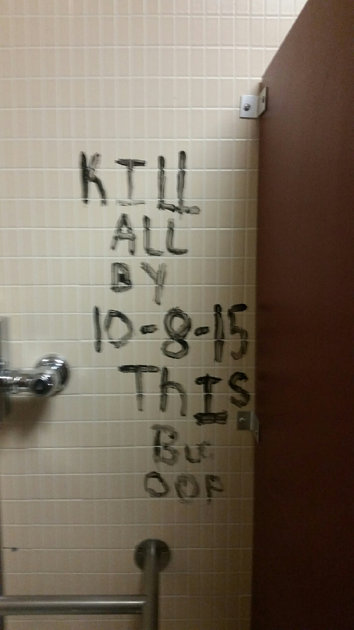 Eastern Kentucky University called off classes midday Wednesday and for the rest of the week, based on a threat found in a bathroom (see photo from university police at right).
Eastern Kentucky University called off classes midday Wednesday and for the rest of the week, based on a threat found in a bathroom (see photo from university police at right).- Southern Oregon University called off all classes Wednesday after a note was discovered that referenced the mass shooting at Umpqua Community College.
- Authorities on Friday arrested a man for making threats against American River College, in California.
- The Federal Bureau of Investigation and the U.S. Bureau of Alcohol, Tobacco, Firearms and Explosives warned Philadelphia-area colleges of threats of violence made on social media to an unspecified college “near Philadelphia.” The threats were for last Monday, Oct. 5, at 2 p.m. Several colleges sent alerts to students and faculty members and -- while maintaining regular operations -- added extra security for the day. Here are the notices sent out by Drexel University and the University of Pennsylvania.
What Does It All Mean?
S. Daniel Carter of the VTV Family Outreach Foundation, a group that promotes campus safety, founded by family members of victims of the mass shooting at Virginia Tech in 2007, said he was still trying to assess the situation.
He said that threats (as opposed to actual violent incidents) sometimes follow mass shootings, so he is not surprised by the number of threats in the past week. But he said the shootings on Friday should not be viewed as part of a specific pattern. He noted that the killer at Umpqua had sought to commit a mass shooting for a while, while the alleged killer at Northern Arizona seems not to have planned anything in advance.
The VTV Family Outreach Foundation offers a list of recommendations for colleges on preventing or dealing with campus violence. Carter said that the most important are having "a multidisciplinary threat assessment team" to try to identify potential problems before they happen and an "emergency management process that has been tested" for cases of violence that do take place.
William F. Taylor, chief of police at San Jacinto College and board president of the International Association of Campus Law Enforcement Administrators, also stressed how the various recent incidents are different. He noted that arguments that become violent, such as what apparently set off the shooting at Northern Arizona, are "as old as cavemen." He said that some of the neighborhoods near Texas Southern have high crime rates. So Taylor said it was problematic to assume that colleges can solve the problem of campus shootings.
"Much of this is more a society issue than a campus issue," he said.
Taylor said colleges should step up training so that students, faculty members and other employees know what to do if faced with someone trying to commit a mass killing. He advocates using the Run, Hide, Fight training program.
New Campus Gun Ban in California
Carter said that his group takes no stands on gun control and Taylor said he did not believe gun control legislation would have an impact on campus violence. But in California on Saturday, Governor Brown signed into law a bill that will bar those with concealed weapons permits from bringing guns onto school or college campuses.
While he signed the legislation the day after Friday's shootings, the legislation had been in the works for months. Supporters noted that California law appears to already ban guns on campuses, but that those registered to carry concealed weapons are exempt. The law now will limit exemptions to law enforcement officials, retired law enforcement officials or those granted permission by colleges and schools for law enforcement purposes.
The bill was backed by many college and university groups, including the California College & University Police Chiefs Association.
The legislation is opposed by the National Rifle Association, which said the bill would "lead to the unjust prosecution of otherwise law-abiding firearm owners."
Campuses Offer Training
Several campuses have announced new campus training programs since the Oregon killings.
The University of Hawaii at Manoa announced last week that it will conduct two-hour training programs for any faculty, other employee or student group on "active shooter" situations.
The State University of New York at Cortland announced that it will conduct two such trainings as well as sponsor a lecture on “Guns and Safety on College Campuses After the Umpqua Shooting.”
The president at Cortland, Erik J. Bitterbaum, said in an announcement of the program that it was important to be prepared. “Colleges and universities are special places that promote openness and freedom of discourse,” he said. “We see strangers here every day, but there are things we can do. It will take constant vigilance and cooperation, but we can help protect our campus from this type of unlikely, but extremely tragic, attack.”

